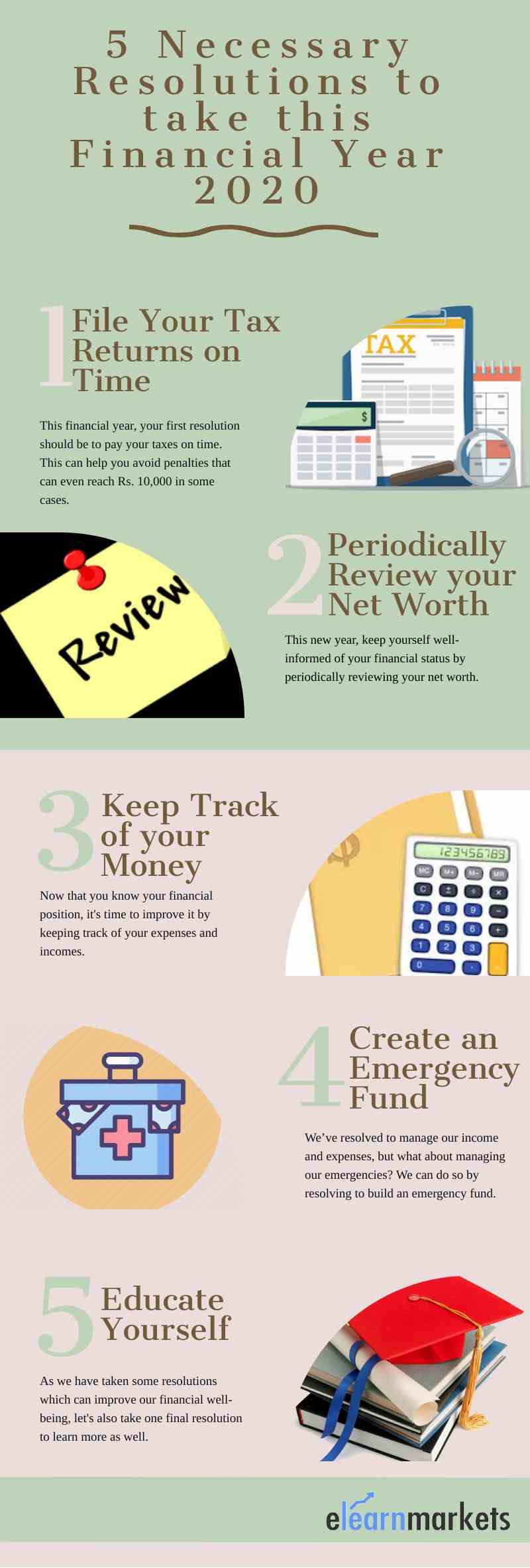Happy New Financial Year!
A new year is perfect for new beginnings, and a new financial year is the best time to begin a journey of self financial planning to make our future more secure.
Since most of us start our new calendar year with some resolutions, why don’t we make financial year resolutions as well?
| Table of Contents |
|---|
| File Your Tax Returns on Time |
| Periodically Review your Net Worth |
| Keep Track of Your Money |
| Create an Emergency Fund |
| Educate Yourself |
Here are five financial new year resolutions you can take to start managing your money this year:

1. File Your Tax Returns on Time:
With a new financial year, comes a new tax cycle.
Paying tax on time should be your first new year financial resolutions. This can help you avoid penalties that can even reach Rs. 10,000 in some cases.
This task is easier said than done, as most of us may find this process to be quite confusing as well.
Also Read: 7 Best Tax Saving Schemes for Filing Income Tax Return
Thankfully, the Government of India is here to help you keep track of tax deadlines with their Income Tax calendar
Also, aim to keep track of any changes in the tax filing process and tax-saving schemes to avoid any penalties in the future.
You can also watch this video to learn more about tax-saving schemes –
2. Periodically Review your Net Worth :
This new year, keep yourself well-informed of your financial status by periodically reviewing your net worth.
Your net worth is a total of all your assets (like your cash and bank balances), minus your liabilities (like credit card and home loan payments).
It is an accurate indicator of your financial health and a perfect way of understanding your debt priorities as well. It should be one of the major financial resolutions in 2020.
Also Read: Top 7 Fundas to keep in mind while availing a Home Loan
You can follow these simple steps to calculate your net worth –
Step 1: Make a list of your assets and accounts. Use the market values of assets like stocks and real estate to make your calculation more accurate.
Step 2: Make a list of your liabilities, like the unpaid balances of your loans.
Step 3: Add the values up in both the lists to get a total of your assets and liabilities.
Step 4: Subtract your total liabilities from your total assets; the answer is your net worth.
Depending on whether your net worth is positive or negative, you can take relevant steps to improve this figure through the next step.
3. Keep Track of Your Money:
Now that you know your financial position, it’s time to improve it by keeping track of your expenses and incomes.
The best way to do this is by making a financial budget. Many of us know this fact, but we are unable to implement it effectively.
Learn from Experts : Financial Planning & Wealth Management
Since we are starting a new financial year, why don’t we try some unique techniques to build our budgeting habit?
You can follow simple tips like these to start –
- Are you having trouble finding the best way to allocate your income? You can try out some thumb rules like the 50/30/20 rule to start and then tweak them to accommodate your needs.
- The simplest way to do a basic financial planning is to make budget in the form of spreadsheet. You can use Google Sheets to keep an excel sheet that you can update on-the-go.
- If it’s a hassle to track your expenses manually, you can use any of the budgeting apps available online. Many of these can track your bank expenses automatically too.
- If you keep forgetting to record expenses, the best thing to do is to keep all the receipts for them and record them at the end of every week.
4. Create an Emergency Fund:
We’ve resolved to manage our income and expenses, but what about managing our emergencies?
We can do so by resolving to build an emergency fund.
As the name shows, an emergency fund is a separate sum of money we keep aside for emergencies.
Also Read : Why you should keep an Emergency Fund?
You might be thinking, “If I’m already setting aside savings through my budget, why should I build a fund for emergencies?” Most people avoid making an emergency fund because of this question.
But the answer to this is simple – when it comes to actual emergencies – hospital bills, sudden unemployment, etc. – our savings might fall short.
For such cases, we might need a massive sum of money all of a sudden, which is why an emergency fund is essential.
The best way to do financial planning in 2020 is maintain this fund by automation.
How? Create a separate savings account and set up a monthly automatic transfer of funds to this account.
Doing this can help you maintain a fund with lesser efforts and earn interest at the same time.
5. Educate Yourself:
Knowledge is a gift that keeps on giving.
As we have taken some resolutions which can improve our financial well-being, let’s also take one final resolution to learn more as well.
This year, let us all learn more about financial planning, investments, and money management to find more ways to grow and maintain our wealth.
Also Read : 5 Simple Tips for Managing Your Personal Finance
With the advancement of online education, we can choose from a plethora of free or paid courses, blogs, and workshops to achieve this goal.
What’s more, you can now do all this on-the-go, through mobile applications as well.
You can also avail our “Learn from Home” offers to improve your trading and investing skills:
- You can avail 33% off on Webinars, Code- SAVE33
- You can avail 33% off on the Recorded courses, Code- SAVE33
- You can avail 11% off on Live courses , Code- SAVE11
Along with these, skill yourself through our advanced excel certification.
Just like every resolution, those given above are just directions to your financial journey.
Whether you successfully continue this journey will depend on your consistency to stick with these essential habits.
This financial year, we hope that you can make the rules of personal finance work in your favour with these resolutions.
Happy Learning!










